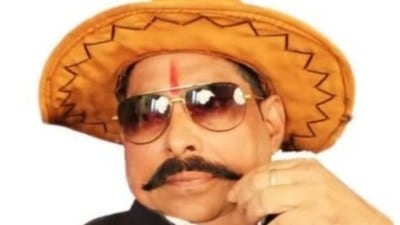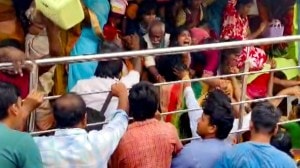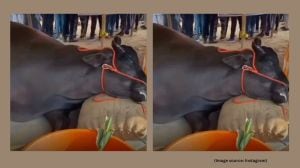The Ambedkar bandwagon
There is nothing like real life to turn a mirror on the political class. The 109th birth anniversary of Dr Babasaheb Ambedkar last Friday ...

There is nothing like real life to turn a mirror on the political class. The 109th birth anniversary of Dr Babasaheb Ambedkar last Friday was celebrated with a great deal of ceremony in the Capital. But even as the country’s leaders flocked to pay homage at Ambedkar’s statue on the lawns of Parliament House came the news of a hanging. An altercation over grazing rights in a village in Andhra Pradesh’s West Godavari district, led to a 35-year-old Dalit being hanged to death. Nothing surprising about this, really, all part of an ordinary day’s events. After all, wasn’t it just a few weeks ago when seven Dalits, including women and children, were burnt alive in neighbouring Karnataka as part of a revenge killing? And what about the regular blood-letting that goes on in the forgotten villages of the Bihar heartland?
Yet what a mighty cause they make of their commitment to Dalits in New Delhi, as each party indulges in the competitive wooing of this community. The BJP, given its upper caste appeal, is in a terrible hurry to establish itself as a champion of the Dalits. It is, therefore, considering a constitutional amendment to annul a decision taken by the Gujral government barring reservations in promotions. The Congress, desperate for any cause that could keep it from being reduced to political redundancy, is today reduced to gestures like “purifying” statues of Ambedkar that were ostensibly defiled because an RSS leader had happened to garland it. On Ambedkar jayanti, Congress Party president Sonia Gandhi formally announced her party’s intention of defending Ambedkar and the Constitution that he anchored. The BJP government’s move to review the Constitution, she darkly hinted, was a conspiracy to deprive the poor and the backwards of the benefits granted to them by that document. The BJP, not to be undone, rushed inwith a “fact sheet” accusing the Congress of not having been true to the spirit of the Constitution by having amended it 69 times. Meanwhile, the Raja of Manda quietly ascended a Jan Chetna Rath, promising in the name of Ambedkar to defend the constitutional rights of slum dwellers.
If the late doctor had indeed been around, it is very unlikely that he would have been impressed by all these protestations of support for the Dalit cause. Ambedkar was a pragmatist, if anything. He knew that no marginalised group, including Dalits, can afford to premise their lives and happiness on the promises of opportunistic entities like political parties and individuals. Instead, he brought a strong rights-based approach to the issue. Dalits, he argued, are citizens of the country and every citizen has the same rights of citizenship. The state’s duty, as enshrined in the Constitution, was to defend these rights of all its citizens equally. In a speech made on the floor of the Constituent Assembly, after the third reading of the draft Constitution, Ambedkar made an additional point that should be of some interest in the current debate. This is what he said: “If things go wrong under the new Constitution, the reason will not be that we had a bad Constitution. What we will have to say is, that Man wasvile.”



- 01
- 02
- 03
- 04
- 05




























